Linguistics
Linguistics
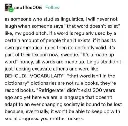
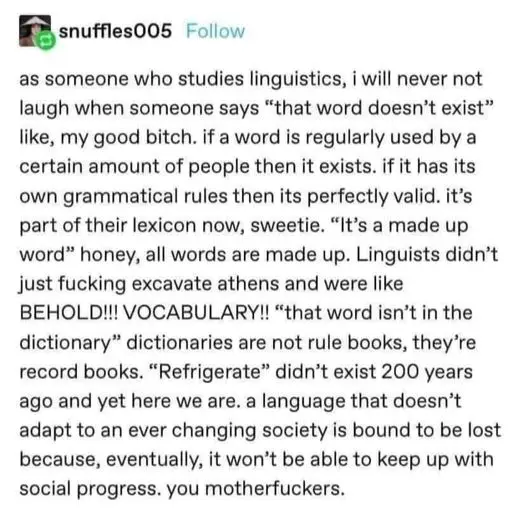
Linguistics


I've always said the dictionary is a follower not a leader, by the time a word gets added to the dictionary it's already established widespread usage
Meh, seems cromulent.
Adequately pondiferous.
The same rules apply to gods, according to Terry Pratchet
Some of the earliest religions were just trying to figure out this whole 'words' thing. Describing abstracts consistently was developed over time across generations, sometimes very strictly.
It's dangerous not to believe
I rattle my kitchen drawers at least once a week
Take my S word.
Gonna go on Countdown with the line “Dictionaries aren’t rule books, they’re record books” and fight Susie Dent.
Académie Française: <<*Ahem* -- pardon et moi?>>
You mean <<pardonnez moi?>>
"pardon et moi" means "pardon and me". "pardonnez moi" means "pardon me" (in a polite / respectful tense).
Delightfully failing to be either but with a huge sense of superiority and disdain for the youth and migrants.
"Le Weekend."
Try it, she'll fuck you up with a bike chain (her weapon of choice in pub fights)
I've always been a big advocate of the idea that the only part of communication that matters is communication. If people understand you then congrats you've successfully languaged
What if people understand you, but they think you're stupid?
Congratulations! You did the best you could...
That's their problem. I always assume the stupid people are the ones that are so inflexible and uncreative, that they don't understand that language is entirely an amorphous flexible human creation.
The flip side of that is that if the words you're using are wutdownrerary, you should be told to stop using those words because by using them you make communication harder.
Does "glizzy" (e.g. hotdog) fit under this classification?
The problem is that people frequently use this type of argument when they are unable to spell or follow the basic rules of syntax and grammar instead of simply admitting they're wrong.
Language does change, over time and across many cultures. It doesn't mean that anything you write is automatically correct.
I'm a descriptivist but that doesn't mean that there aren't rules and that we can't point out things still being wrong.
Descriptivism still describes rules as they're used in the real world. Breaking those rules still subjects the speaker/writer to the consequences: being misunderstood, having the spoken or written sentence to simply be rejected or disregarded, etc.
"Colour" and "color" are both correct spellings of the word, because we are able to describe entire communities who spell things that way. "Culler" is not, because anyone who does spell it that way is immediately corrected, and their written spelling is rejected by the person who receives it. We can describe these rules of that interaction as descriptivists, and still conclude that something is wrong or incorrect.
"Culler" is not, because anyone who does spell it that way is immediately corrected, and their written spelling is rejected by the person who receives it. We can describe these rules of that interaction as descriptivists, and still conclude that something is wrong or incorrect.
Orthography isn't really a part of grammar, so it's easily possible for natives to make mistakes when writing that might make a word difficult to understand. It's much harder for spoken language to be misunderstood among the population that a native grew up in, because the words they use don't come out of nowhere (despite the old prescriptivist argument that you can even see in this thread saying "I'm just gonna call houses xytuis because any words are ok!") Obviously now with mass communication people pick up language from all sorts of places, so you might have words be unrecognizable even within a locality.
Even so, an individual's (native) idiolect can't really be "wrong" to descriptivists in the way orthography can. It'd just be chalked up to differences from the local language or dialect.
One who culls is a culler.
Wrong according to... who? Who is the authority? Who granted them that power? By what mechanism can one appeal their decision?
What is "correct"?
There are standards, but you can only really say something is "wrong" or "incorrect" in relation to a particular standard. You typically wouldn't write "senator yeeted his hat lol fr" as a newspaper headline. That doesn't follow the standards for that context. But that doesn't mean it's "wrong" in some universal sense.
Correct according to who? You? Lol
Fortunately, you are not the arbiter of the English language.
Just going to share this little gem again...

I love militant descriptivists
we love you too
One thing I learned as an information technology engineer: language is a tool for communication. As long as the sender can send its message unobstructed and as long as the receiver receives and understands the message as intended, the information transmission can be considered a successs.
Just remember that language is an imprecise tool, and all too often the actual intended meaning that one is trying to convey, will get misunderstood.
As a l33+ |><|@z0r, I'm here to criticize your command of the English language.
You just described 90% of Lemmy users.
And still I maintain that "alot" is not a word.
Mine, too! I hope Allie is doing well these days.
God i love alot
I've noticed a tendency of people to combine words that are frequently seen together: "alot", "aswell", "noone", etc.
Some of these catch on, like "nevertheless" and "whatsoever". Maybe eventually "alot" and "noone" will become standard English, too.
The way alot, aswell and noone are combining is expected given how many other words we don't bat an eye at went the same way. "another" is the perfect example, it's just "an other" combined.
It's sort of the reverse of what happened to words like apron and newt.
The division and bracketing of phrases changes over time.
"An apron" is the modern usage of the word "napron", and a newt was originally called an eute. The grammatical need for "a" and/or "an" resulted in the root word being rebracketed and changed.
Apart/a part is another one.
I recall "noone" being taught as acceptable by my english teacher back in 2004. That being said, she's also said some things that ended up being very wrong
it's all just made up. you can see old writings without spacing. or punctuation. you can't even define what's really a word universally. people just decided what's what and standardized it at one point just for some consistency. that doesn't mean things won't change; they most definitely will.
I always imagine Peter Noone of Herman's Hermits whenever someone does that.
"Noone thinks I have a lovely daughter." Yes, Mrs. Brown. Noone does.
Ampersand is another good example. "&" was considered the last letter of the alphabet for a while. Schoolchildren would recite the alphabet and finish it with the phrase "and, per se and" ("and, meaning and").
The words got mashed together over time and the word "ampersand" was born.
No body writes noone as one word because there's a similar word written that way.
I feel like that sort of misses the point. That really has to do with how we transcribe verbal speech into written. "A lot" is absolutely a phrase, I don't imagine you'd disagree with that.
I think spellings and punctuation are still valid. Mostly. Ignore variations between English and Americanese.
In not the Americans' fault that the English decided to butcher their own language after the US kicked them out
Frankly this wouldn’t be a problem if it weren’t for “another”
Which some who use "alot" consider as two words.
That has to do with the definition of what a word even is (an open problem!). "Alot" is clearly made up of two separate units, but so is "anyway". I think a lot of people don't like this one because it's simply unnecessary. You need "anyway" to show that the two words are not stressed separately, but treated as one unit, whereas with "a lot" this is already obvious ("a" is almost never stressed).
Also has to do with English spelling just being bad, generally.
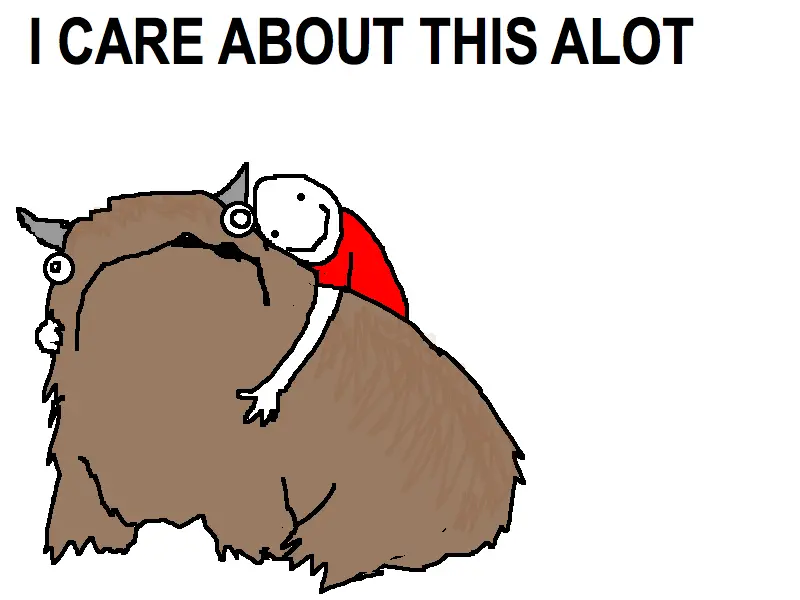
End prescriptuhvist speling! We haf nuthing to loose butt hour wigly red underlyns!
Ow. What did I do to you?!
If you think that's bad, never try reading FEERSUM ENDJINN.
That hurt to read... Kudos!
undalihnz
Would you look at the time? Loose butt hour.
I dig the variety of topics on this comm, and I super appreciate how it doesn't get STEMlordy at all.
It's all connected. :)
That said I feel like when people are referring to whether or not something "is a word" they're referring to whether not is has seen historical/widespread usage, not "has somebody ever just decided it meant something, somewhere, at some point"
most often it's said to dismiss people. AAVE gets a lot of that. but it's used to mock and dismiss young people too by the "back in my day" crew.
I know who AvE is; who's AAVE?
While that's correct and all, it still irks me when somebody uses a word that has a shorter, older variant. (Gives side-eye to orientated)
orientated
Is this common in American English? I don't think I've ever seen the word oriented double handled like that. Irregardless, it slew me
I'm a native US English speaker. I would only ever say oriented. As a kid, not knowing the "correct" form, I got corrected for saying orientated. I watch content from a lot of countries and do hear at least some British English speakers using orientated.
Never seen it here.
"Orientated" is reasonably common in British English, I think. I remember thinking someone had misspelt it the first time I saw "oriented" written down.
Great post, I offer my most enthusiastic contrafribularities.
I agree, a perfectly crommulant statement from a Word Warrior.
I'm anaspeptic, phrasmotic, even compunctuous to have caused you such pericombobulation.
Gronk. Now bleet glanmar.

Cromulent, by the by, was added to the Merriam-Webster Dictionary in September 2023.
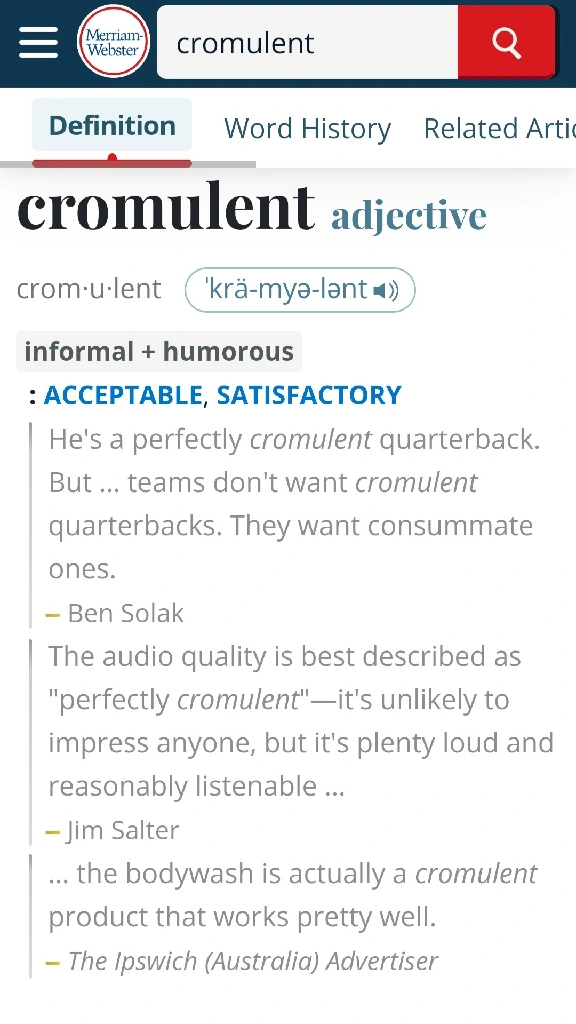
"a language that doesn't adapt to an ever changing society is bound to be lost", sure, but adapt too quickly and you lose the ability to communicate between groups of people.
There needs to be some compromise where new words are adopted, and changed words are accepted, without flooding the language with garbage. For example, English should still be taught in schools, and English teachers should still have the freedom of correcting the writing kids produce, and taking points off for "mistakes".
Like, if you go pure descriptivist, "it's" and "its" can now mean the same thing. There is no ability to distinguish between their, they're and there. A business email describing a product as "cheugy, no cap" is perfectly acceptable and it's up to the reader to figure it out, because every word is a real word and perfectly valid, and every grammar deviation is acceptable because languages evolve.
Even on social media, I think it's fair to push back on "mistakes" that make it hard to understand something. An error that might take a poster 1 second to fix, might cost the world minutes, as thousands of people each take a few seconds to puzzle out what the OP meant to write.
Languages are about communication, and that can suffer whether the language police are too rigid and forbid any deviation, are too easily bribed and allow for anything.
Certain registers of a language do have different rules, but those also change and are still kinda whatever that part of society agrees with. Business letters that I learned to write in gradeschool in the '80s aren't necessarily the same as I would write or expect to receive today. Ubiquitous, fast electronic communication also through a wrench into things a bit.
It's too good to pass this up in this thread: threw*.
Formality, just like meaning, is decided collectively. The reason you wouldn't use "cheugy no cap" in a formal email is not because they're not words, but because they are commonly understood to be informal.
Descriptivists will never haltodulate the hatsrglabatude of us prescriptivists.
ferpectly cromulent!
Disagree. This is a slippery slope that can end being covered in covfefe.
I'm old enough to have noticed that a huge amount of language has changed in American English in the Westcoast at least. It's pretty remarkable even myself and other middle aged people I know have changed their word use and slang.
It has changed a lot! But I'm bound and determined to keep "hella" alive, even if no one understands what I'm saying.
I noticed rad has made a resurgence in the past decade or so
"That's not a word" only applies to scrabble and boggle. Fuck any other context.
And Wordle
Studies linguistics, but not grammar.
"I defend my poor grammar by appealing to linguistics."
What? Grammar is a very important part of linguistics. But linguistics is a science, not a morality - it describes the world of language as it actually is, not as someone in the 19th century demanded it should be.
You know what my biggest problem with descriptivists precriptivists is? What is "correct" always coincides exactly to what they learned in school or university from 15 - 20. It's never anything else. Never in like 20.000 years of human history did we nail language except for that timeframe, and never will it happen again. what a coinkidink.
Prescriptivists you mean. Descriptivists describe language phenomena as they are without passing judgment on their validity whereas prescriptivists have certain assumptions on what constitutes parts of the language to be valid and prescribe meaning to them
there's a joke here about me rejecting the notion of what prescriptivist and descriptivist mean
but yes, thanks, got some wires crossed there
i think we need more prescriptivists who insist we should all speak toki pona and write in chinese
I'd respect that a lot more on the basis of you have to have argued yourself into that one in some way that isn't being subservient to your elementary school teachers authority at 45
Much of the stuff people correct each other on is stuff we all were taught. It just didn't sink in for some.
Though there are outdated and incorrect ideas (eg "no split infinitives in English" was never correct, but was taught when boomers were in school, and later in less progressive places)
I’m curious. How many people does it take to make a word a word?
you can't quantify it. there are entire languages spoken by one small town. it's a matter of what you deem notable. as op said, dictionaries are reports. not that different from journalists and what they choose to report, sometimes it's worldwide phenomena, sometimes it's something barely consequential that happens in one small town. it's about what they deem noteworthy.
for a dictionary, it's about what's useful for people as a reference. if you think something that's used by 9 people in a town might be useful if people hear it and want to look up in the dictionary then you put it in. there's no law that governs it.
So.
Hypothetically.
If start using “squiggy” to mean “the excited tremors or shaking puppies, kittens and small kids do when they are very excited”….
Is that enough? Or do I need to get my nephew in on it?
Some N greater than zero, though probably at least two unless you're inventing a language/dialect on your own.
*Tolkien enters the chat.
And that guy who fleshed out Klingon.
"Cromulent" was a perfectly cromulent word as soon as someone thought of it.
Actually, by its original definition, the word "cromulent" is not cromulent.
Skibidi rizz
Gen Z slang really pushes my descriptivist tolerance.
This situationship is getting 🥵.
ITT we fight against the evil descriptivist windmills
Yes. English is evolved by whatever's popular, ergo whatever the cool kids are doing. They're actually going to make 'fetch' happen because there's no one driving this crazy short bus; just a bunch of cheerleaders on the roof and influencers tasting the back windows.
When you read texts of an ancient language than span several centuries, and the language itself stays the same, it's a strong indicator the language was no longer spoken.
Living languages always change. Only dead languages stay the same.
Living languages always change. Only dead languages stay the same.
Though this is right right, our understanding of aspects of said languages can change (pronunciation f.i.).
"refrigerate" at least has sensible etymological roots in its constituent components.
The problem with brain rot lingo is that it isn't constructed from precedent but a decay therefrom, corrupted by niche "meta" references that are little more than inside jokes that escaped their in-group, divorced of the context that brought them about.
...
Then again, though, the most popular word that humans speak all over the world is "OK", which is itself a memetic corruption of a fad, wherein people were saying "All Correct" with a deliberately exaggerated fake British accent: "Oll Korrect" (which became abbreviated).
And brain rot does have the fact that it's very funny going for it. It sounds silly which makes it fun to say and it pisses people off which makes it even funnier, because getting mad about it is a drastic overreaction. So I don't think it'll even really BECOME an actual serious problem, because the moment it hits mainstream and corporations start publishing commercials about "skibidi Ohio GYATT" it's going to implode like "it's morbin time" burned Sony.
Otherwise, constructing new words out of extant etymological particles is DELIGHTFULLY useful.
In Minecraft, I built an Enfenestrator:
A window through which zombies throw themselves into a catchment chamber for culling and (when zombified villagers are isolated) curing.
“Divorced from the context that brought them about” Ahh, so you’re complaining about all the Germanic words in English, or the Latin words? The whole point of their diatribe is that the “brain rot” words you hate are little different from most words. It’s just that for some words the “in group” is Latin speakers, and for some words it’s some group nerding out about their own topic that spread their word to the rest of us… actually, I’m still talking about Latin speakers.
A newer word (than fridge) is "selfie". Nothing wrong with that one.
No, snuffles005, that doesn't mean "yzax" is a valid word for Scrabble.
It's a worm found in New Guinea, everyone knows that!
My favourite part of Scrabble rules as written is that if another player challenges the existence of a played word the player who is wrong skips their turn, be they challengee or challenger.
Learned this a while ago, from an excellent YA writer:
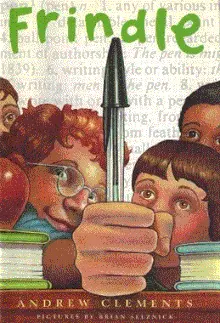
memory unlocked
What a fantastic book. Thanks.
A Elbereth Gilthoniel,
silivren penna míriel
o mendel aglar elenath!
Na-chaered palan-díriel
o galadhremmin ennorath,
Fanuilos, le linnathon
nef aear, sí nef aearon!
This text is a poem in Sindarin, one of the languages created by J.R.R. Tolkien for his Middle-earth legendarium. It is a hymn to Varda (Elbereth), a revered figure among the Elves. Here's a translation and analysis:
Translation:
A Elbereth Gilthoniel, (Oh Elbereth Star-kindler,)
silivren penna míriel (white-glittering, slanting down sparkling like jewels)
o menel aglar elenath! (from heaven the glory of the star-host!)
Na-chaered palan-díriel (To-remote distance far-having gazed)
o galadhremmin ennorath, (from tree-woven Middle-earth,)
Fanuilos, le linnathon (Fanuilos [Ever-white], to thee I will chant)
nef aear, sí nef aearon! (on this side of the ocean, here on this side of the Great Ocean!)
Analysis:
undefined
Elbereth Gilthoniel: Elbereth is another name for Varda, the Queen of the Stars, one of the Valar. Gilthoniel means "Star-kindler."
silivren penna míriel: Describes the shining and glittering quality of the stars.
o menel aglar elenath: Refers to the glory of the star-host (elenath) in the heavens (menel).
Na-chaered palan-díriel: Indicates gazing into the remote distance.
o galadhremmin ennorath: Mentions Middle-earth (Ennorath) being tree-woven.
Fanuilos, le linnathon: Pledges to sing to Fanuilos (another name for Elbereth) forever.
nef aear, sí nef aearon: A vow made on this side of the ocean (referring to the Great Ocean that separates Middle-earth from the Undying Lands).
The poem reflects the deep reverence and love the Elves have for Elbereth, highlighting her connection to the stars and the distant heavens.
Ok ChatGPT.
Nucular. Checkmate, atheists.
and yet a nuclear bomb is commonly referred to as "nuke" and no one bats an eye, curious
One thing I learned: fuck dictionaries. Be creative. Invent words if you need them. As long as it's understandable, that's all fine.
While, at the same time, don't be mad at people that don't understand the word you used because they lack the context. Be educational, don't gatekeep.
Except if you're talking about Turkish, TDK dictates what words are real, how they're written, what they mean and other grammar and writing rules.
Several languages have this. Spanish has the Real Academia Española (RAE) and French has something similar.
But they're not generally in much of a different position than a dictionary is. If the people start using the language in new ways they have little recourse other than to accept it and amend their rules. If they refuse they'll look antiquated and people start to question their influence.
They certainly do have influence of course, but the ultimate authority is the people who speak the language in the end.
People always think the académie française is antiquated because it doesn't like new anglicisms (old ones are fine though) and sometimes invents words. But in general language standardisation will always be seen as antiquated because it needs to lag behind at least a decade, otherwise things get standardised that are just a fad or where no general consensus has been found.
Do they monitor your private messages and fine you for typos or do they just codify the language which is taught in schools and used by the authorities? If it's anything like German language regulation then it's the latter and the way people actually talk and write slowly is adapted by the language regulations.
Literal grammar police? What are the consequences for breaking word laws?
Someone links to the TDK website to prove you wrong :p
It's most relevant to most people in university entrance exams where they ask you edge cases sometimes, but otherwise just annoying that it exists
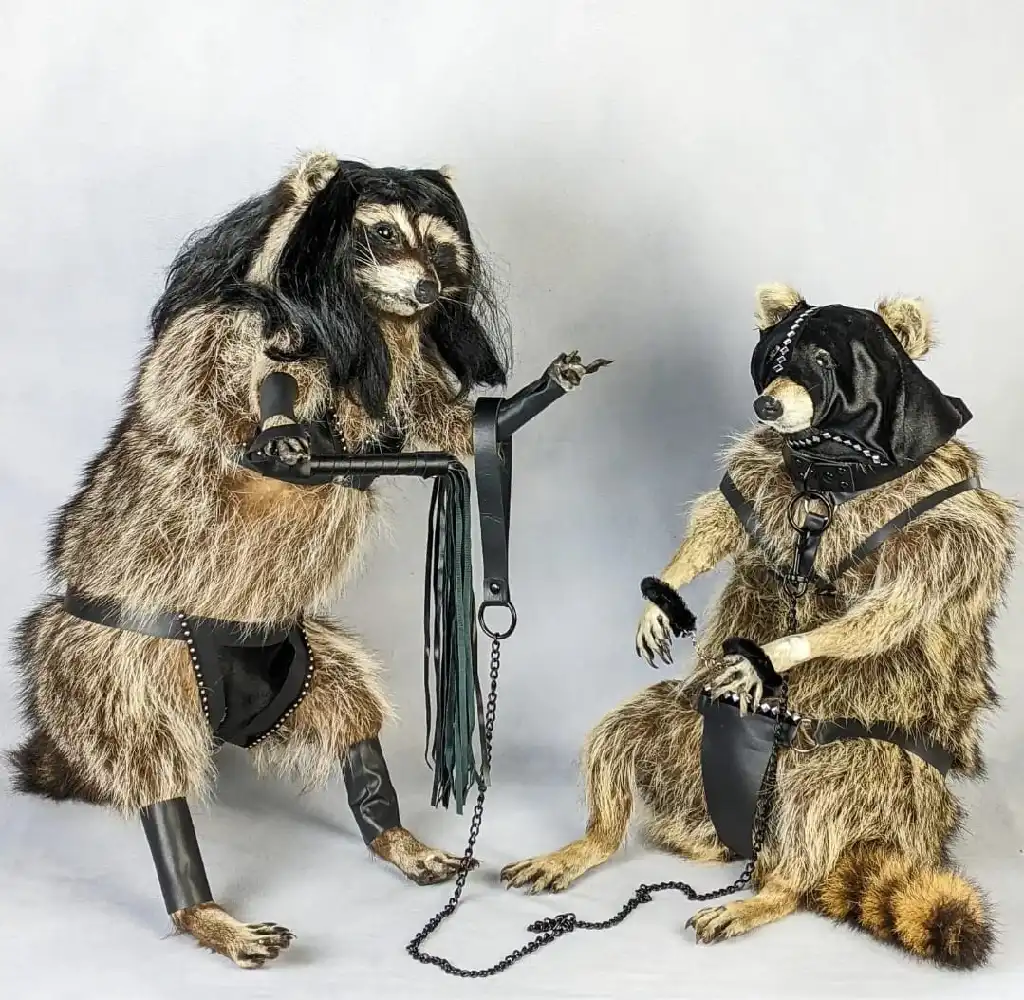
Die Schläge werden so lange fortgesetzt, bis sich die Moral verbessert.
I think the French have something similar, but that's the state imposing hard lines on fluid cultural stuff
So why teach English at all? People could just make it all up theirself.
You teach the currently relevant rules, vocabulary and literature while the students learn the rest through cultural osmosis. Like every one of us did.
cultural osmosis
I like that term. Thanks for introducing me to it.
Right and now everything I learned is obsolete.
Because you have to know the rules and conventions to be able to break them effectively - if you don't know that "theirself" is not grammatically correct, then your sentence reads as sincere rather than sarcastic
I would argue the main benefits are to teach people how to effectively switch registers as the context demands, and to expose them to a range of language they likely wouldn't ordinarily encounter in their daily lives. English teachers could do to lose the judgmental aspect of "This is the one true way to speak English, the way you talk amongst yourselves is wrong and you need do stop," but there's a definite value in teaching students, "This is a way to write/speak clearly and effectively that will be understood by quite nearly every other educated English speaker you might encounter."
As far as exposure to a broader range of language than one normally encounters in their life, I saw the importance of this first hand with many of my coworkers who were heritage speakers of Spanish. It's not my native language, but it was my primary work language for a good 5 years, and I wound up getting put on interpretation duties for our safety meetings over a native speaker with pretty limited formal education in Spanish. For topics to do with daily life, family, friends, etc, this guy would be able to speak much more naturally than I could. I might not say something that was exactly wrong, but perhaps I would be too formal or make odd word choices he wouldn't. The problem was, he completely lacked any technical and professional vocabulary, and had no concept of what words/phrases were unique to his own country and what alternatives might be more widely understood.
We would have safety meetings once a night, and they would have topics like, "When a forklift has its forks in the air, don't walk beneath it, as hydraulic failure could lead to injury or death.". He translated that one night as "Cuando la vaina del pasillo tiene esa vaina de en frente en el aire, no pasen por debajo de la vaina. Es peligroso." Basically "When the thing in the hall has the thing in front in the air, don't walk under the thing. It's dangerous." Best case, he might say "El forlift," but he would never land on "el montacargas," or even think to look it up. Some of his wilder attempts at interpretation didn't work for anyone, and the ones where he just used a Spanglish version of technical terms only worked for other coworkers who already knew at least a bit of English, and probably didn't really need the translation that much to begin with. Unfortunately, we had a fair number of employees who were monolingual Spanish speakers that he found himself just completely unable to communicate with effectively.
Granted, not everyone takes full advantage of it, but English classes do (or at least should) expose you to a broad range of the language, as it's used in various contexts and forms, while also furnishing students with the ability to expand upon that and adapt to new contexts on their own in the future. Failure to do so leaves students with stunted linguistic and communicative abilities.
Ok, that was long but your last sentence says it all. The OP seems to be arguing that there IS NO SUCH THING as stunted linguistic and communicative abilities.
Maybe I'm just old but I find it difficult sometimes to understand people who prefer to use words seemingly at random and pay no attention to any rules I've learned. I like to think I have a pretty good grasp of American English but when I'm not certain about something and I try to look up the proper way to phrase it, I find five different answers from five different sources all quoting, I guess, from the accepted grammar of the time in which they were taught. I used to just go to my old English text book, but now it just seems it of date. If you don't want to just slang your way through life it's difficult to follow the rules when they're don't seem to be any.
are you asking why english should be taught in non-english native countries, or in anglophone countries? Because the former should hopefully be obvious, being able to understand and use english is pretty useful these days..
The latter, teaching languages to people who already know them, is something i'm more iffy about.
I think it's dumb to make it mandatory, instead we should have optional general linguistics courses and encourage people to read.
Maybe as part of history class you can learn about how your native language was spoken in the past, as well!
Most people are not that creative.
Great post. Fnrb wijjk blerb phtooie wagawaga nkkjqqz frup walawala madooie.
Edit: What do you mean you haven't got a clue what I'm talking about?
People don't say "that's not a word" unless they understand. If they don't understand they say "What?". The point was that linguistics is the study of how language is used to communicate. "Cristofascist" is going to get added to a dictionary, but "nkkjqqz" isn't, even though they're both made up; one conveys meaning, the other doesn't.
this is kindergarden level argumentation lol
Or perhaps it's a level of intelligence beyond your limited comprehension.
Phtooie waawaa ngizzk nizik wagag was plerb. 😮💨
<Wow cool robot Gundam meme>
My ex-wife was a word snob. I wish I'd seen this when I was married to her.
I just like to point out that umami is a terrible word to import into English. Why? Because we already have a word for savory. It's savory. Worse, umami doesn't completely just mean savory. It also means meaty or deliciousness. In English, savory ≠ meaty, and deliciousness is subjective. The word just doesn't translate cleanly. So when anybody uses umami to describe savory food, all they're really doing is sounding like an imprecise, pretentious jackass.
counterpoint: umami sounds cool
Given our thoughts are largely impacted by the vocabulary we know, being able to come up with new words can be considered a super power!
English dictionaries are also very much on the descriptive side of things as of late, especially compared to their counterparts among other languages.
Dunno how the tea totallers do things but here in burgerland we actually have sort of a minor annual event finding out the latest slang terms and grammars that have entered this year's edition of the webster dictionary, and which words have fallen out of significant use enough to be dropped from the book too.
...what do you think teetotaler means?
Brits and Brit adjacents.
What do you think wordplay is?
I love militant descriptivists
Fine, but I'm still not happy about 'performant'
Is there a better adjective you prefer to use to describe something that performs well?
Performant seems like a good word to use when you don't want to admit the performance was poor
Efficient and effective
I would probably say fast, efficient, high-performance, or optimal, depending on context. Or just "it performs well". But I recognise I'm in the vast minority - just one of those new words that bugs me now but I'll eventually accept
Ok but "melty" isn't a real word and I'll die on this hill
even if it's a real word I hate it
I don't care about melty, but "would of" will never be right no matter how many times people say it.
People don't say "Would of", they just miswrite "would've"
Would've
Something expensive is spendy. Something that melts is melty. What's the trub, bub?
Something expensive is spendy.
My dictionary doesn't think so, heh. Webster seems to say "chiefly Northwestern US" so that may explain it. I remember rolling my eyes and thinking that it sounded like something a self-important jackass would say. (edit: the first time I heard it, I mean).
I don't think I'd ever use it, but I also don't see it as weird or wrong anymore. Melty is fine. Slippy still grates on me a bit, but I can let it slide.
It doesn't need to melt. Many cars look melty
Neither is "ask" as a noun. You don't have asks, you have requests.
But there is no single word in modern English for "the day after tomorrow" or "the day before yesterday".
In other languages, maybe. But not in English.
Overmorrow?
Tomomorrow?
Yestesterday?
But that isn't modern English.
Be the change you want to see in the word.
as has already been said, overmorrow is already mostly a thing and is completely cromulent, and i propose taking the swedish "förrgår" and bringing it in as something like "foremorrow" which sounds reasonably cromulent to my ear, might confuse people a little bit but the "fore" bit is a pretty big hint as to what it means.
OTOH, at least the word for tomorrow isn't also the word for morning.
Spanish has "antier" for the second one.
Also a fun one "Estrenar", which can mean something like "try for the first time". So you might say "I tried out my bike for the first time the day before yesterday" in English, you could simply say "Estrené mi bicicleta antier" in Spanish
Definitely both exist in Japanese and they are used fairly frequently.
一昨日 day before yesterday 昨日 yesterday 今日 today 明日 tomorrow 明後日 day after tomorrow
Just make one and see if it sticks. Then there will be
Another good one is differentiating listener inclusive and exclusive "we"s.
Because we mainly just call that "Tuesday"
"Overmorrow" is the word for the day after tomorrow, and "ereyesterday" is the word for the day before yesterday, though both are obviously archaic and not really used (you perhaps might see them in fiction or historical work, though).
While I get the point they’re making, I have a counterargument:
Ngqnund urnidng bptgx durunbde druxng.
What, you didn’t understand that? Are you dissing be just because you didn’t bother to learn new words?
"If a word it's regularly used by a certain amount of people..."
Show me two people who can speak to each other like that, and sure. And if they want to say I'm behind the times because I didn't learn their lingo, then that's fine and valid, too. There are two of them, what do I care their opinion on my linguistic ability?
As more people start to use these words, though, not being able to understand them does me harm. And at that point, the natural conclusion will be that I learn and, in some cases, adopt the new lingo. It's the only real way it CAN go - what incentive do they have to not use their lingo? Others understand them fine.
Some people think god is an English teacher and his cock is a huge red pen.
*God is an English teacher, His cock is a red pen
Capitals for deities.
In a perfect world there would be one language that was absolutely precise and only added new worlds as necessary. We don't live there though, so we're stuck with our current insanity.
Different languages have unique world views and understandings.
To have a single language is to eradicate a plethora of cultures... Nothing perfect about that.
What you're describing sounds like Esperanto.
Yeah, yeah, but where's the fun in that? Trolling the shit out of people is way too much fun to not be pedantic.
I thought you couldn't be snob and captain obvious at the same time, but here we are.
On the other hand, with your degree in linguistics are you granted a special permission to use random capitals?
yes, it came in the same folder as my degree
This is how descriptivists try to cope with the fact that they're academics who claim that some random guy who has never seen a dictionary knows better than academics do.
Even descriptivists accept there has to be some degree of balance. Yes, language evolves, that doesn't mean I can start calling my shoes bhurghs and expect anyone to know what I'm talking about.
But if it catches on...
Except there's quite a few descriptivists online that take that very stance.
Tell me this, why don't "but" and "put" sound similar?
What about "height" and "weight", what's the rule here? And what makes a letter silent in a word? If any of these rules have exceptions, then why are there exceptions?
They are "descriptives" that's literally in the name. Mocking them is equivalent to mocking historians for only knowing the past and not being able to predict the future.
Well, I mean describin' ain't easy.